#alchemy is a scientific attempt at magic
Explore tagged Tumblr posts
Text

Creation of the Earth, Wilhelm and Jan Goeree, 1690 - via The Cosmic Dance by Stephen Ellcock
4 notes
·
View notes
Text
TMNT OCxCanon Comp Round 1


Learn more under the cut!
Konkon Inari
@countlessgifts
Donatello; dating -> bitter exes and academic rivals
Konkon was born to a family that trained in ancient magic rooted in ritual and emotion. She was never any good, always confused by her teachers’ vague instructions, wanting to know how it was all supposed to work. She always felt like the stupid one in her family. Donnie introduced her to the wonderful, logical, world of science. She was glued to his every technical rant and learned quickly. It was all perfect until she discovered alchemy. Konkon loved this scientific way to look at magic. Donnie thought alchemy was pointless at best. Konkon thought Donnie dumb for not getting it. The fights were petty and endless. Eventually The honeymoon phase had ended, and they broke up, going their separate ways.
Until Konkon's sister went and married Raph. Now they're both in their 30s, still bickering over who's field of study is superior, and occasionally having family dinners where they aren’t allowed to sit next to each other.
>>>>>>>>>>>>>>>>>>>>>>>>>>>>>>>>>>>>>>>>>>>>
Jezebel [Jessie] Hamato
@lovelettersbythesea
Girlfriend, and later wife of Raphael Hamato
A sweet girlfailure who despite doing her best, gets trapped in a tragic series of events which both dooms and saves her. Freshly moved out to New York from the bible belt in order to make a life for herself and escape her past, Jessie meets Raph after being Attacked by a living curse that attaches to a new host each time it’s slain. They get together after she mutates, and despite the fact she later locks her identity away in an attempt to save the people she loved, her love and devotion to her family is what saves her.
https://www.tumblr.com/risemia/761539723459166208/information-for-the-oc-x-canon-bracket?source=share
>>>>>>>>>>>>>>>>>>>>>>>>>>>>>>>>>>>>>>>>>>>>
15 notes
·
View notes
Text
FCG: LET'S CHANGE THE SUBJECT, WHAT WERE YOU ORIGINALLY GOING TO ASK ME. [...] CGA: Is Magic A Real Thing
Magic is tricky to define. Personally, I’d consider a fictional phenomenon to be ‘magical’ if the story ignores any scientific principles which may underpin it. If the story presents a phenomenon as something that doesn’t need to be explained to the reader, then that phenomenon is, or may as well be, magical.
FCG: WE CAN ALCHEMIZE PRACTICALLY ANYTHING WITH THE RIGHT MATERIALS AND GRIST. FCG: WE CAN, AND DID, MAKE SUPER POWERFUL WEAPONS AND ITEMS THAT CAN DO PRACTICALLY ANYTHING. FCG: WHAT ADDITIONAL ADVANTAGE COULD MAGIC OFFER? ALL THIS SHIT IS PRACTICALLY MAGIC ANYWAY. FCG: BUT MORE LIKE FCG: GOOFY SCIENCEY MAGIC. YOU KNOW?
So I agree with Karkat - and actually, I’d go even further. Sburb’s basic mechanics aren’t practically magic - they are magic.
That’s not to say these mechanics have no rules. Alchemy is well-defined, and I can happily theorize about it - but the comic will probably never explain how an Alchemiter creates matter from nothing. That’s magic.
CGA: I Need To Figure Out A Way To Stoke This Volcano CGA: In Case You And The Others Are Successful In Recovering The Queens Ring
What, are you going to pull a Frodo?
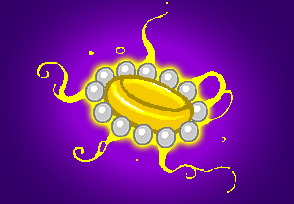

Oh my god, you are!
So that’s what the Forge does. It probably melts it - and given that this is the Forge, the metal is probably used to make something else. Raw material for the Ultimate Alchemy, perhaps?
CGA: Still Baffled By What Would Conceivably Cause Such A Crisis In Awesomeness Post-Victory FCG: WELL FCG: FOR STARTERS FCG: HAVE YOU SCROLLED UP TO THE TOP OF THE TIMELINES YET?

Whatever this is, it takes place hours in post-session Karkat’s future. After a certain point, Trollian completely flips out, and refuses to load anything past this position on the timeline.
The simplest explanation, of course, is that there’s nothing to load.

I prefer the boots, but that is pretty sick. I award it second place on the podium of Sburb mobility devices.

DRAGONSPRITE: sniff sniff DRAGONSPRITE: hey terezi! DRAGONSPRITE: heeeeeeeyyyyyyy! DRAGONSPRITE: hiiiiii terezi!
The intelligence of a sprite is proportional to its ingredients. Dragons are typically rather clever, but this one is just a wyrmling, so she’s probably comparable to Jaspers.
If sprites age, that could change - but I’m not sure she’ll have the time. The trolls’ sprites are conspicuously absent from the Veil.

CG: OK I GOT YOUR MESSAGE CG: THANKS FOR NOT HASSLING ME ABOUT IT IN ONE OF THE MEMOS TO GET MY ATTENTION, I APPRECIATE THAT. CG: UNLESS YOU DID, BUT IT WAS IN A FUTURE MEMO I HAVEN'T WRITTEN YET, IN WHICH CASE HAVE A BIGTIME FUCK YOU ABOUT THAT IN ADVANCE. [...] GC: M4YB3 1 W1LL ST4RT MY OWN BULL3T1N BO4RD GC: 4ND 3V3RYON3 W1LL B3 4LLOW3D TO R3PLY 4NY T1M3 TH3Y W4NT GC: 3XC3PT FOR GUYS W1TH NUBBY HORNS, OH NO, TH3Y W1LL NOT B3 4BL3 TO R3PLY 4T 4LL
These two are pretty messy, but here’s my full read.

I’m fairly sure that Karkat was referring to Terezi here. He has a flushed crush on her, but her personality mildly annoys him sometimes. His irritation, paired with his genuine attraction to her, is confusing him, making him wonder if this is actually a blossoming kismesissitude. He’s therefore started forcing himself to insult her, even in places where it doesn’t naturally fit.
You see in the paragraph above, where he sincerely thanks her for her tact, and then immediately pivots to flaming her for potential rudeness? That’s clumsy pitch flirtation, from someone whose heart isn’t really in it.
Terezi, meanwhile, is harder to crack. I’m pretty sure she’s attempting both pitch and flushed flirtation, but I can’t tell what she actually feels. She definitely likes Karkat, but I don’t know what direction. There’s a decent chance that she just doesn’t know herself - which is, if nothing else, pretty realistic.
CG: THIS IS AN EMPTY THREAT, BECAUSE IF YOU MADE A BOARD AT ANY POINT ON THE TIMELINE I WOULD BE ABLE TO SEE IT RIGHT HERE AND READ THE WHOLE THING ALREADY. CG: WAIT... CG: OH GOD, YOU ACTUALLY DID.
C’mon, dude, you know her better than that!
136 notes
·
View notes
Text
Shitty cape idea #1: Framework
Can force people and items in a small radius to act according to well-defined explanatory or predictive conceptual frameworks, regardless of accuracy, provided that she understands it well. Can throw inertia of projectiles off by making them subject to Aristotelian physics, perform impossible chemical reactions by imposing medieval alchemy laws onto compounds, or even temporarily alter individuals’ behavior and personality by making them act according to their zodiac sign.
Former psychologist-in-training, triggered after being laughed out of her thesis defense (a spirited argument for the efficacy of Freudian psychoanalytical techniques against modern criticisms). Works best with established conceptual frameworks that are or have been believed by and developed by many: she rarely gets any results attempting to follow obscure magical systems, but regularly creates amazing (if temporary) effects by imposing ancient natural philosophy, religious doctrine, pop psychology, or even popular fiction onto the world around her. Her need to have a firm understanding of the frameworks in question has led to her becoming an expert in a variety of outdated, unaccredited, or otherwise not scientifically-respected belief systems. Cursed to always be right about how things work, but only by changing how they work, separating her from any chance of real understanding she coveted.
Villain, often mistaken for a tinker due to utilizing a variety of da Vinci-esque war machines that shouldn’t physically work. Constantly captured, stays out of the birdcage by acting as a lie detector to authorities whenever she’s in custody. She originally did this by imposing the karma system from her beloved Maggie Holt series onto prisoners undergoing interrogation, until she realized it was simpler and more reliable to impose a framework where polygraph tests work onto polygraphs. Killed in Gold Morning before anyone thought to use her to fake a working fusion reactor.
141 notes
·
View notes
Text

'Aconite' and Monkshood under Barateon's rule, Wolfsbane on the Northrealm, Devil's helmet on the South, and "Voidflower" was it called on Myar.
Azuriel was fascinated from the moment she first learned about this mysterious plant from Brother Noriel.
And, the very first lecture she was told right then, to avoid it.
Then, of course, there are two sides of the coin - it has a wide range of effects other than severe toxicity to warm-blooded species, HOWEVER, one has to be a properly trained arcanist/apothecary to unlock those.
Next alchemy lesson came, and she was still fascinated by the properties of the plant, that Brother Noriel had to dedicate a special class to the topic.
And it was worth it.
Lesson 1. History:
I.) Aconite it is called after Barateon's attempt to suck out creativity, imagination and fun from everything with a decree - substances, mixtures, ingredients, molecules and the like, has to be called by their 'scientific' name - to 'emphasize realism among the common folk ' as he likes to put it.
"So, instead of 'Monkshood', we got Aconite, derived from itz most prevalent alkaloid prezent in zhe plant : Aconitine."
II.) 'Voidflower' originates from the ancient Aeterna folk from Myar Aranath, because they associated the flowers with 'INVISIBILITY' and the 'VOID'. They knew a method of 'extracting' this 'magical property' of the toxin and infusing it into a subject or an object - but it was risky, results varied on too many factors outside of the subject's control (experience & magical prowess of the enchanter, level of expertise, subject's health condition, even race and many others.)
No wonder both the ingredient and the 'service' was blooming on the black market of Ertorath - although very few aeterna arcanists mastered the enchantment, but nearly every one of them wanted to hack their way to the quick coin.
(Sidenote:
Jeele was one of those few, who actually mastered this ritual, so when Azuriel became a part of his 'family' on Nehrim and told him about her 'adventuring style', it was obvious for him to help her out with this special enchantment.
Not only by the goodness of his heart btw, because they were in desperate need of a new performer, the 'Trickster' as he called it - and Azuriel's unique look and her furtive skillset made her in his eyes a nice addition to their performance.
III.) Other names are indicate the common usage (wolfsbane) or refer to the looks (monkshood) of the plant - nothing extra to talk about.
Lesson 2. Harvesting of the plant.
Not recommended - but if your lives depends on it, always use GLOVES. The toxins are all over the plant, and they can be absorbed by the skin, causing all nasty stuff.
The root contains the most of the alkaloids - but breaks down pretty fast in direct sunlight, so store it in a cool dry place until usage, but better use it asap.
Lesson 3. Usage
1. In medicine, highly trained apothecaries can use the extract (after a very careful and precise neutralizing process of the toxins) for anti-inflammatory and analgesic purposes.
2. More simple and common usage is applying the ticture onto a weapon - commonly ranged ones to poison the target.
3. And the 'arcane-method' from Myar.
"Detailing the usages would eat up a whole new special lesson, and you probably won't need it in practice, but, there is a whole book dedicated to the topic in the Library if your curiosity is still not satiated."
#vynblr#nehrim: at fate's edge#monkshood#shadowgod#fanfic#flora#ingredient#tel'imaltath#fanficlore#aconite#alchemy
15 notes
·
View notes
Note
what if you talk a bit more about that gay little jester you put in a mirror that would be funny i think
i forgot his name lol hehdgdhshdgdg
Oh yeah I’ll talk more about him. I’ll GLADLY talk more about Drisco. He likes the attention, too!
Origin and Design
Drisco and his rival/counterpart/toxic yaoi partner Castarian both originated in a dream I had. While Castarian was named, Drisco wasn’t, so I had to come up with something myself. It rhymes with “disco” but my intention was to derive something from “discord”.
So he’s one of the newest, and one of my more favored designs, since I’ve gotten better at designing OCs. I only have his top half planned out, since that’s mostly what appears, and the attempt at his bottom half isn’t set in stone…. But here he is!

Maybe I’ll give him stupid little pointed shoes with bells on the end.
Story
In life, he was the jester for some nobleman- he preferred that over working for a king, because he got juuuust the right amount of attention.
While I don’t have a lot of story planned out for this world , I do have a concept for their religion/magic system. It’s heavily based on flowers and their magical or divine properties. A lot of flower-based products are sold at markets because of their importance. They can be used for protective charms, healing salves, scents, etc. Alchemy is a major factor in their scientific and magical developments.
Drisco, however, dedicated his life to studying magic dealing with blood. This magic was darker and considered taboo, but he recognized it as the other side of the coin of the holy flowers. They’re both natural substances and, if applied correctly, have magic properties, and therefore have worth to any god(s) they believed in.
So Drisco learned how to control blood. He learned summoning rituals, ways to puppeteer people, ways to cast illusions, etc. He learned what was thought unethical to figure out- what the worth of a human soul is.
He studied this in the shadows of his jester life. Every so often he’d make trips into the forest to gather materials and stop at towns to put on a show. He met Castarian that way- in a fae-riddled forest. I might talk about the circumstances of their meeting and their complicated relationship sometime else; there’s a lot to it.
Anyway. Drisco eventually got caught studying this sinful magic. And so, he was executed, and just to make extra sure he couldn’t cause more harm, his spirit was cursed into a mirror. (Castarian died as a result of his death, too. Again, it’s complicated.)
The mirror was transported to an abandoned fort and covered with a cloth. Drisco, sentient as a spirit, couldn’t see out of the mirror with it covered. He spent centuries in darkness… and as someone who’s so fond of attention, that… that wore him down a little.
But he did discover he could control the interior of the mirror. It could become any scene he liked! He could simulate any place he wanted- outdoors, indoors, doesn’t matter! But the frame of the mirror always stays the same amount of space behind him, no matter how far it looks like he’s gone. And nothing is real in the worlds he create- he can’t feel the sun on his skin or breathe in fresh air anymore.
One day, the mirror was uncovered. And he was overjoyed. Immediately he started talking to the person who uncovered the mirror- only to quickly discover they couldn’t see him. And again, his hopes fell.
But even as they left, the mirror stayed uncovered. He could finally glimpse the room he was left in! It was… dusty and old and in the process of being cleaned up as a tourist space, but it was better than a black nothingness!
He also learned that Castarian, as a ghost, hangs out in the same fort. Somehow, as a spirit, he’d followed Drisco here and hadn’t left his side. At first, Drisco was touched…until he learned that it was because Castarian blamed him for his death and had waited all this time to yell at him. Whatever friendship they had dissolved as they argued.
Drisco is furious at Castarian (again, for complicated reasons), and wants his revenge. It’s a little hard to avenge oneself when one is trapped in a mirror, though…
As more and more people trickle through the not-so abandoned fort, Drisco realizes that some people can see him. He talks to those people, and starts to manipulate them. He gets them in their own for a while and puts on an entertaining show- perhaps with lights set up in the background of the mirror and a giant wheel of fortune, all modern game show things with a medieval twist!
But he always rigs the games and cheats to win. Every single one of his participants dies after losing enough games and being forced to do a favor for him. Slowly he gains more power with every death, having his players draw their own spell circles on the ground that will spell their demise and give the value of their soul, blood, and flesh to Drisco.
And he loves it. It only he could get back at Castarian….
Other Notes
If I could fully figure out the mechanics of Drisco’s game show, I think he’d be VERY fun to roleplay, especially if everything was left up to chance.
Despite his sadistic demeanor, Drisco had actually been very lonely. His shows are not only spectacular because he’s fruity, he’s also trying to capture your attention and make you stay. He only kills people he gets bored with- or if they had some really, really bad luck in his games.
And speaking of him being fruity, this man is gay. That’s right, he’s one of them homosexuals. He has a crush on Castarian (but it’s more of an obsession), but if you get on his good side and stick around a lot… he might get attached to you. I think he could definitely settle for more than one partner.
Unfortunately, he’s well aware that he’s good-looking and that people want to kiss him. And he WILL use this to manipulate people. But interact at your own risk.
Also when he gets mad, I think he should be allowed to look increasingly demonic, as a treat.
I made a drawing of him recently that’s my current Discord pfp!
TW: Some blood

That’s all!
…for now. Knowing him, this won’t be the last time I talk about him.
#artbabble-tm#oc: Drisco#oc: Castarian#goblinbugthing#ask#ocs#doodle doodles#doodle gallery#I love him. I hate him also but mostly I love him.
3 notes
·
View notes
Note
I RETURN FROM WORK! Between thus and me rereading Skulduggery Pleasant I have a strange fascination with exploring the war crimes of magical skeletons.
Your Honour, my client (Alechemy) is by no means a perfect or infallible soul. Those who question his actions are perhaps right to, after all you should always be skeptical of your government officials. However, so few members of the jury consider his perspective on events and judge him in ways that he cannot be expected to answer to. I put it to you that Alchemy's actions were reasonable, rational and justifiable given the information he had at the time!
It's no secret that the biggest issue people take with my client is his treatment of one Error Sans, traditionally known as simply Error or in one particularly strange event, tError. Before anyone judges my client for actions taken against this figure, I would remind the members of the jury that Error is responsible for Genocide on an incomprehensible scale.
That is no exaggeration, your Honour. Whilst prior to his capture there was a lull in his activity, Error is responsible for countless lives and worlds lost, and despite previous attempts to make peaceful contact, showed no inclination to stop at any point. His crimes are more than enough to justify practically any punishment, and even then my client hesitated.
The council may have trapped and tortured Error for scientific purposes, but my client was insistent on keeping things done as humanely as possible, routinely disagreeing with the methods used by one Swapfell Undyne and doing as much as possible to ensure that the council as a whole proceeded with as much care as possible.
The methods used to deal with Error - notably a water tank that forced him into unconsciousness and memory loss medication that pacified him - were undoubtedly extreme. However, they were also essential in order to properly study and understand this monstrosity, as well as being a just response for the immeasurable numbers of lives taken by him. I challenge the jury to say they would be so passionately against this treatment of Error were he to have gleefully slaughtered their families and friends, taken their homes.
Now, the prosecution may be thinking that such treatment of Error is unjustified on the basis that we as an audience understand Error as a person, more to the point that he is redeemable. But my client could not possibly know this, and in fact has every reason to believe the opposite.
In brief, my client's handling of the Error situation was arguably more dignified than the multiverse's greatest mass murderer deserved and more importantly was an entirely justifiable course of action for him to take. His choices may not have been ideal, his actions may have been cruel, but they were an understandable and dare I say inevitable series of choices that someone had to make, and I truly believe he made the best calls possible given the information he had to hand.
The defence rests, your Honour.
A good analysis from Liz, like usual! Anon, what say you in response?
2 notes
·
View notes
Text
There's a lot to unpack here so I'm going to skip any unnecessary part. A day has passed, I have been through more books than I own and I had to limit the amount of information to note since my head is overflowing. Here's a few pages on alchemy practised in different parts of the world:

Transcript of the first page: Alchemist tried to split anything into very very mall pieces. There was even the attempt of a periodic system that puts chemical elements in order. Though they used so called "Decknamen", secret codes for substances only alchemists understood. There are a few noble metals: gold (associated with the sun) and silver (with the moon). The base metals are quicksilver and mercury (associated with mercury), copper (with venus), iron (with mars) and tin (associated with jupiter).
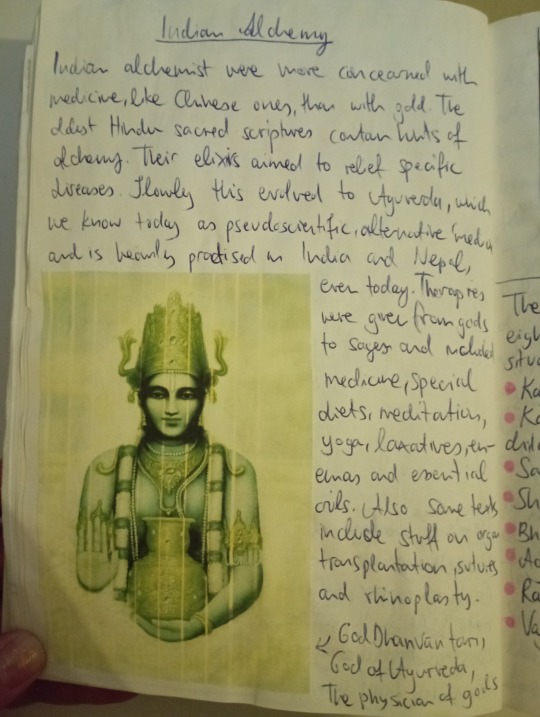
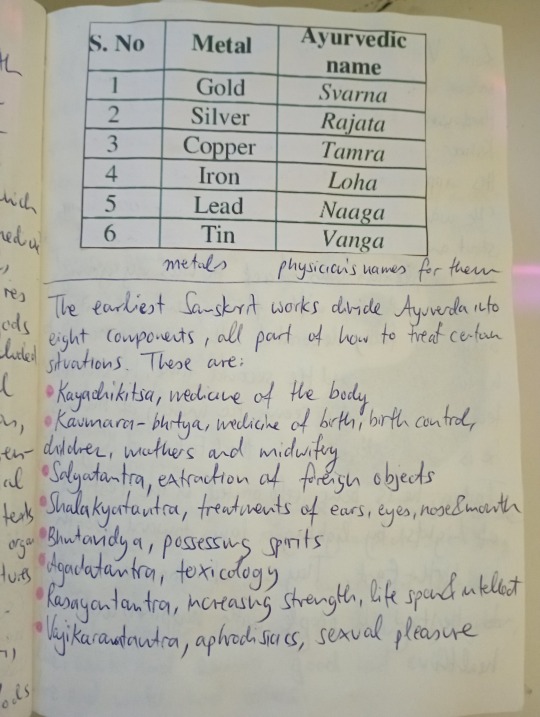
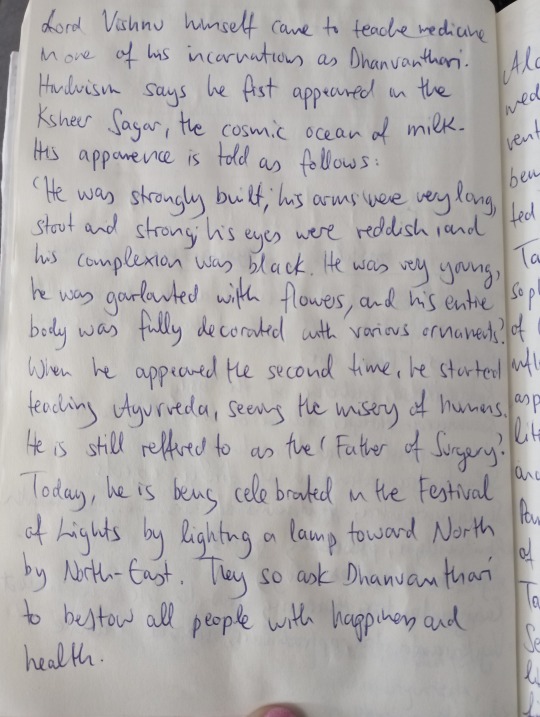
Transcript of the second and third and fourth page: Indian alchemists didn't care much about gold but rather health. Even the oldest sacred Hindu texts contain alchemy and their elixirs were aimed to relief specific pains and diseases. Through this Ayurverda came into existence which is used today in India and Nepal and has no scientific evidence to support its use. It is said that gods have given mortals the recipies, including special diets, forms of meditation and essential oil mixtures. Even organ transplantation and rhinoplasty are mentioned. Lord Vishnu came to Earth and taught medicine as Dhanvanthari. His first appearance is in the Ksheer Sagar, the cosmic ocean of milk: "He was strongly built(...), his eyes were reddish and his complexion was black. (...) his entire body was decorated with various ornaments." The second time on Earth he gave humans Ayurveda and is referred to as "father of surgery". He is celebrated today in the Festival of Lights and people ask for happiness and health for all people.
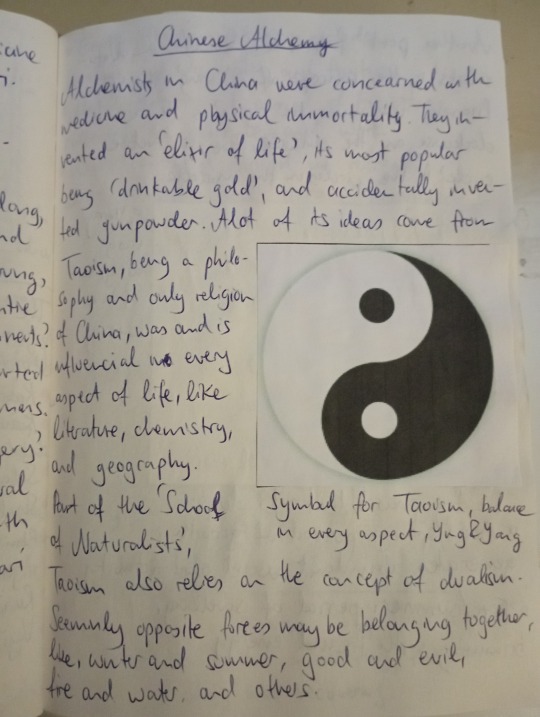
Transcript of the fifth page: Chinese alchemists were interested in medicine and physical immortaloty, and invented an "elixir of life", also called "drinkable gold" and accidentally invented gun powder. A lot of influence came from Taoism, the only religion and philosophy of China, which relies on the concept of dualism. Opposite forces belong together, even if they initially clash, like winter and summer, good and evil and water and fire.

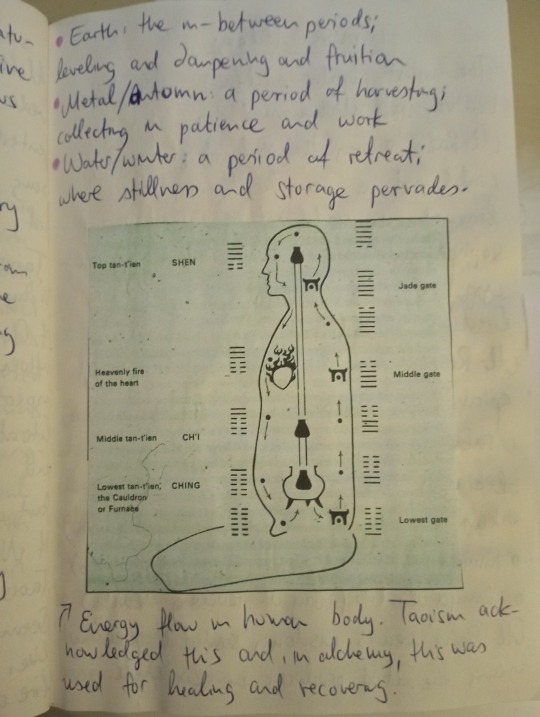
Transcript of the sixth nd seventh page: Another part from the "School of Naturalists", the belief in Taoism, is the concept of the "Five Phases". The generative cycle is the arrows clockwise on the outside, the destructive cycle is the inside arrows. The phases last 73 days:
wood/spring: period of growth; generates abundant wood and virtality
fire/summer: period of swelling; brimming with fire and energy
earth, the in-between period: leveling and dampening and fruition
metal/autumn: a period of harvesting; collecting patience and work
water/winter: a period of retreat; where stillness and storage pervades.
The flow of energy in human bodies was used as a base for healing and recovering.
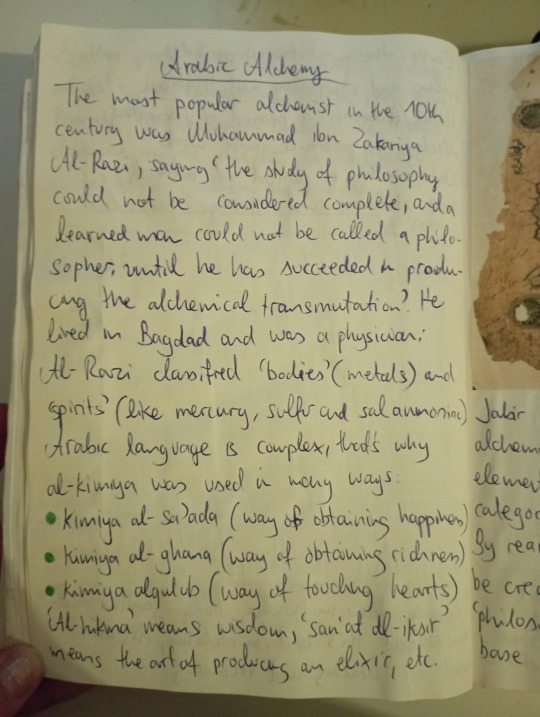

Transcript of the eighth and ninth page: Arab alchemy is probably the most known one. The most popular alchemist was Muhammad ibn Zakariys Al-Razi. He said "the study of philosophy could not be considered complete, and a learned man could not be called a philosopher, until he has succeeded in producing the alchemical transmutation". He was a physician living in Bagdad and he classified metals as "bodies" and "spirits". There are several al-kimiya (meaning "wisdom") in the Arab world:
kimiya al-sa´ada (way of obtaining happiness)
kimiya al-ghama (way of obtaining richness)
kimiya alqulub (way of touching hearts)
Jabir ibn Hayyan who mostly wrote books on alchemy and magic analized each Aristotelian element and categorized them: hotness, coldness, dryness and moistness. By rearrangng these base metals a new one would be created, whicht hen gave birth to the idea of a "philosopher's stone", a substance that turns base metals into gold.
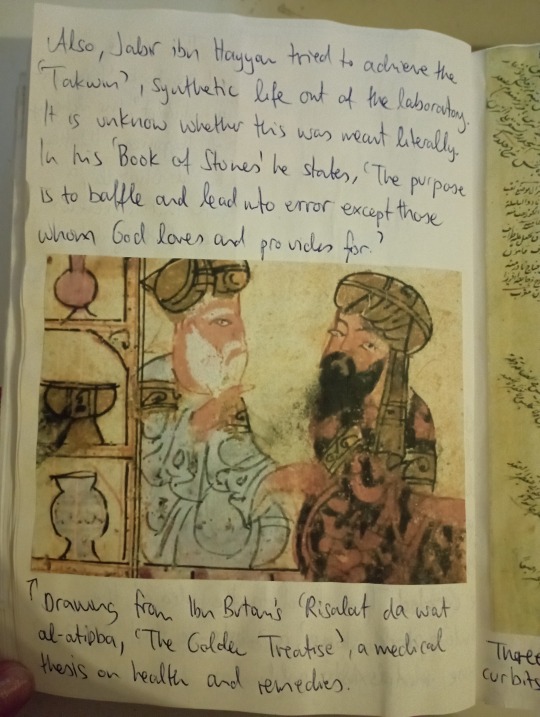
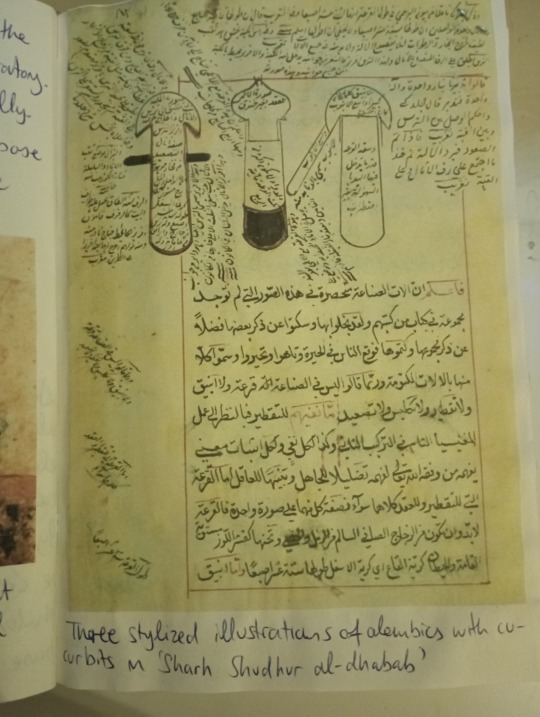
Transcript of the tenth and eleventh page: Also, Hayyan tried to achieve the so-called "Takwin", synthetic life. It is unknown if this weas meant literally. In his "Book of Stones" he states "The purpose is to baffle and lead into error except those whom God loves and provides for." Next is an example of a page that contains glass test tubes like we know today.
I find the idea of creating a synthetic human terrifying and interesting as well as unnecessary, yet it caught my attention so bad I am currently analyzing a paper by Kurmo Konsa, a professor of history and archeology. He might answer my mail, too. Could one reawaken the nephilim if desired? Whatever. I have this to wait for...and Carvier's diary pages are still next to me.
#tomb raider angel of darkness#traod#classic tr#tomb raider#angel of darkness#journal#aod#lara craft#tomb raider series
6 notes
·
View notes
Text
Magic and Occultech
The Old Ways: Different cultures and civilizations formed magical traditions and cycles as a way of understanding and influencing the world and how it worked, and the early inhabitants of the Archipelago were no exception. Different systems arose out of different priorities, necessities, and limitations of organization; on one island, water and fire were held to be oppositional forces for the obvious reason that water could put out a fire, but on another island it was wind and water that were the dominant frameworks for all other magical forces, as they were the key factors that determined weather for travel, trade, and agriculture. Dozens of such systems proliferated and mutated, enduring because as a means of organizing important knowledge and focusing magical energy, they worked. Trying to explain how different systems with different connections between elements and astral bodies could all work together at the same time was a passion project for a few half insane occultists that never gained traction with practical spellcasters of any sort.
Enter The Rationalists: The Rationalist Movement was the first widespread attempt to organize and systematize magical knowledge, prompted by the scientific refinements taking place elsewhere in the islands. The mechanics of motion and machinery were being codified into the laws of physics, while chemical knowledge was codifying the reactions between substances independent of the astrological influences used in alchemy. The Rationalists seized on this windfall of new knowledge, as well as the experimental rigor devised by naturalists and proto-scientists as a safeguard against error, and proceeded to deconstruct centuries of custom and tradition to a set of predictable magical laws. Surprising only the Rationalists, this made a lot of more traditional magic users very unhappy.
The Rise Of Occultech: The fundamental axioms of Rationalist Magic are not that much different than the basics of magic in any other tradition; first, the world is filled with cycles of energy, and second, that energy can be harnessed by certain structures, materials, and practices. Where the Rationalists deviate from orthodox magic is in dispensing with elemental polarities and categories entirely. Energy, magical or otherwise, is categorized by its media and the defining characteristics used to measure that media; Sound, Gravity, Electricity, Magnetism, and Light. While traditional spellcasting concerns itself with both the physical and symbolic attributes of elements like Fire or Water or Earth, Rationalists describe everything in terms of frequency, phase, amplitude, capacitance, induction, and resonance.
Magic And Machinery: The principle advantage of Occultech is the possibility of industrial scale, mass produced magic. The magical effect can be produced automatically without the original spellcaster to maintain it. The principle disadvantage is that Rationalists tend to rely on external machinery to amplify their own innate magical attributes or to produce completely novel effects. If that machinery is lost, stolen, or damaged, the Rationalist is limited in what they can do. The potential of Occultech has drawn attention from commercial ventures, military planners, and academic researchers; each of them would have their own uses for, to use one example, a steam engine driven by a magically catalyzed flame that burned without consuming fuel, yet reached temperatures hotter than any other known fuel source.
Pushing The Boundaries: While Occultech devices have slowly spread throughout the islands through a mix of idealistic inventors and pragmatic investors, the research behind it all has progressed at lightning speed, due in no small part to the efforts of one Silas Van Der Horne. The average person on the street marvels at technology like instant cameras, helicopters, and antibiotic medicine, but Silas has developed versatile computational calculators (shortened to "computers" to save time), self directed mechanical automatons, suits of armor that enhance the strength and speed of the wearer instead of slowing them down, flying vehicles that can reach altitudes so high that the air is too thin for normal propellers or rudders to control them, and most dramatically of all, biological modification that allows the growth of living organisms almost to order. It is this last innovation that has provided him with the dinosaur like creatures used by his cavalry forces and mounted dragoons. Yet all of these miracles are overshadowed by his most ambitious research, which he keeps closely guarded after his best friend abandoned him for it: Using the power of Occultech, Silas believes that he can transcend the limitations of the world he was born into, and contact or even enter another world, where powers that might as well be gods reside. (He's right.)
1 note
·
View note
Text

𝕞𝕒𝕣𝕔𝕠 𝕟𝕒𝕧𝕒𝕣𝕣𝕠
he was born forty-five years ago, is a witch and lives in acacia heights as a physician/alchemist, and is in aquelarre del cuervo coven. he looks an awful lot like roberto urbina.
“Life isn’t easy, no matter where you are. You’ll make choices you think are right, and then suffer for them.”
tw: cult mention, drugs, substance abuse
For centuries the Navarro family name–in addition to a reputation as founding members of the infamous coven, Aquelarre del Cuervo–has been synonymous in occult circles with one unique discipline: Alchemy. Attempted by many yet mastered by few, their specialized techniques are closely guarded secrets and have been passed down for generations through the Navarro line. Though advancements in science have propelled human capabilities into the realm of what once might have been considered ‘magic’, there is still no better means by which to transmute or alter the very building blocks of matter or magic than via the talents of a Navarro Alchemist. The secret to the Navarro family’s alchemical prodigiousness is the use of enhanced opiates, which serve as magical conductors; amplifying arcane energy far beyond what a single caster might otherwise command. Patriarch Ramon Navarro realized this, and decided to position his family ahead of the accelerating curve; an adaptive strategy for a changing world. Pivoting his arcane mercantile into a pharmaceutical company, Cuervo International, he pioneered the modern day fusion of magic and medicine, using alchemical techniques to develop groundbreaking and remarkably effective treatments for an array of mundane human maladies. The endeavor’s success propelled the Navarro fortune into orbit.
Marco Navarro was born in Mexico City; the only child of Ramon Navarro’s eldest son, José, and his human wife, Julia. The two doted upon their son and his upbringing was undeniably privileged, though not without exposure to the realities of the world. Renown socialites and philanthropists, Marco’s parents often included him in their humanitarian efforts; pouring resources into medical research charities and outreach. It was through these experiences that Marco discovered his own passion for building a better world, and saw his best path to do so was not as a pharmaceutical executive like his father, but as a doctor.
In conjunction with his family’s arcane instruction, Marco received a world-class traditional education; eventually attending Harvard Medical School in Boston where he pursued internal medicine with a focus in hematology, later returning to Mexico to complete his residency and undertake a research fellowship at his family’s institution. Enabled by his combined arcane and scientific training, Marco’s vision delved into uncharted territory. Treading into the gray zone of what constitutes sanctioned practice, he turned his sights away from the alchemical standards of substances and chemicals used to treat illness and disease, and instead onto the potential for alchemy as a more direct vehicle for altering a patient’s physiological state of being: blood magic, in the most literal sense of the term. Practicing such a taboo discipline has not come without personal cost. Some on the coven’s high council, and within his own family, have spoken out in disapproval of Marco’s work citing its dangerous implications. Others are more supportive, and see his refinement of such techniques as a the natural evolution of medicine. Proponents within the coven further note the applications beyond human healthcare, suggesting possibilities such as superior synthetic blood for vampire consumption, or lunar shift blockers for lycanthropes; perhaps even cures for their conditions. Detractors consider the value to other species a liability; one which might threaten the Navarro family’s proprietary techniques or the security of the coven at large. Debate has been fierce, and Marco has been caught in the crossfire; at times pulled at the seams by dangerous, conflicting orders he is not at liberty to disobey. Aquelarre del Cuervo is as much a cult as a coven, many say, and strict adherence to the council’s edicts is demanded of its members.
Compelled by his coven’s council to wed the daughter of another wealthy and powerful family in a match chosen for political purposes, Marco spent his youth trapped in a decades long loveless marriage with someone who wanted very different things from life. Although their union did yield one child–a daughter whom Marco adores and dotes upon endlessly–it was clear that duty and obedience were the only mutual sentiments shared between husband and wife. Mounting stress both in his professional and personal life at times drove Marco to seek respite through abuse of alchemical opiates; a grim facet of the Navarro legacy. This further exacerbated the already untenable state of his marriage, and Marco continued to spiral. On Christmas Day, 2022 he suffered a very public overdose. It was a family scandal, an international embarrassment for Cuervo International, and the excuse his wife had been long awaiting. Divorce papers were served while he still lay in a hospital bed recovering. Under growing pressure from his coven to abandon his research entirely, and with nowhere in Mexico City safe from his family’s judgement and influence, Marco decided he was overdue for a change of scenery.
Embarking on an extended sabbatical from his research fellowship with Cuervo International, Doctor Marco Navarro has relocated to the sleepy Colorado town of Greywood, intent upon re-centering himself and continuing his work in a less politically fraught environment…one where the supernatural is not so veiled in secrecy, nor his personal life so scrutinized. He purchased an obscene luxury home just on the secluded outskirts of acacia heights in town with a view worth the price tag, where he lives with his familiar; a crow named Magdalena. There is a separate wing of the house reserved for his daughter, when she can be convinced to come and stay for a while. Marco is quickly learning that life is very different from what he had been accustomed to here in his new community. With intentions to get back to basics, he has accepted a position at Greywood General Hospital as an Attending Physician.
Most who meet Marco Navarro will realize rather promptly that he is a wickedly intelligent man, and he knows it. If a conversation turns toward an area he’s knowledgeable about, he’ll be sure to let everyone else know it, too. Though not exactly prone to boasting, it is clear that he’s passionate about his work. Despite what some might characterize as arrogance in this regard, Marco is a deeply caring and empathetic person. He would help his worst enemy if they needed it, without a moment’s hesitation. Charismatic by nature, he’s been called a ray of sunshine; quickly warming to even the most unlikely of people. While he is seldom intentionally impolite, he does tend to be exceedingly blunt and exhibits a decidedly oblivious bourgeois outlook. Some find it charming, others abrasive. Compared to the decadence with which he was raised, he now lives a fairly private, if not entirely modest lifestyle; though no one would accuse Marco of cheapness or frugality. Navarro coffers run deep, and Marco’s doctor’s salary is a pittance compared to his trust fund. If he wants something, he buys it with the effortless nonchalance of someone who has never had to wonder whether or not there is enough in his bank account to cover the expense. Even so, he’s a generous sort and prone to altruism and philanthropy. His background and workaholic tendencies have been isolating in a sense; he is a man of many acquaintances, but few close friends, and since his divorce he considers himself “chronically single” (self-diagnosed). Those who have become dear to him are doted upon and can expect unwavering loyalty.
“what power did he attain when settling in greywood?”
None.
penned by... chell
#town rp#mature rp#oc rp#supernatural rp#small town rp#horror rp#literate rp#para rp#mystery rp#witch#roberto urbina fc#cult tw#substance abuse tw#drugs tw#retired
0 notes
Text



J. Augustus Knapp : Alchemical Illustrations
1 note
·
View note
Text
ENG 346 Lit Review 2
Linnaeus The Alchemist
“Linnaeus Forgets” is an extremely fantastical short story by Fred Chappell that recounts a fictional event where the real historical figure Carl Linnaeus was sent a plant that had magical properties. The narrative starts with some background on Linnaeus and explains that he is considered very famous in his home country of Sweden. Linnaeus has already studied and classified every plant in the area and teaches students what he knows about botany. His life seems very happy, he is appreciated by his peers and is overseeing the construction of an orangery to house exotic plants never before grown in Sweden’s cold environment. Young ladies like to send Linnaeus dried flowers in hopes of discovering a new species, or perhaps getting a token of the famous botanist’s attention. It is not often that Linnaeus receives a plant unknown to him, most of the time they are from sailors or missionaries visiting lands mostly unknown to the europeans. There is one occurrence though, from which this story takes place, where Linnaeus is gifted a plant whose properties are supernatural to mankind as a whole. The story of “Linnaeus Forgets” is a liminal fantasy that plays with magical themes in a real setting, the result being a story of a man of science confronted with a world wholly new to him. The main usage of liminality in this story is the combination of the natural science of botany with the outdated renaissance science of alchemy, as is seen when we get a glimpse of how Linnaeus feels about plants, and the actual plant he receives from the dutch sailor.
The usage of Liminality in “Linnaeus Forgets” is first set up when the audience reads how Linnaeus feels about plants and their biological sexual workings. Linnaeus has just received a seemingly dead plant by package from a sailor and he watered it before leaving it for a while to teach one of his students. He returned to the plant and it had come back to life, he suspected that it was simply dormant before. That night he attempted to sleep, but was bombarded by the memory of Johann Siegesbeck attacking him and the validity of his work. Siegesbeck implied that Linnaeus’ theory of sexual reproduction in plants was morally corrupt and that it would “shock female modesty” (Chappell 256). Linnaeus combats this by stating that plants are above human ideas of what is good and bad. He claims that when Siegesbeck called his system of classification as immoral, he also claimed that nature itself was immoral. The audience is given a full idea of how Linnaeus feels about plants when it is stated
“It seemed to him that plants inhabited a different world than the fallen world of humankind, and that they lived in a sphere of perfect freedom and ease, unvexed by momentary and perverse jealousies.”
(Chappell 256). This line is the true beginning of the narrative’s liminality as it is setting up the otherworld of plants that Linnaeus goes on to see for himself later when the mysterious flower grows to its fullest potential. This thought from Linnaeus foreshadows the fact that the flower presents to Linnaeus an otherworldly realm where royal balls are an often occasion and mediterranean gods are paraded to the people. In this statement we also see that while Linnaeus is a man of science renown for his naturalistic knowledge of plants, there is also a spiritual side to his work. Whether or not he reveres plants as higher entities is unknown, but it is certain that his scientific work is motivated by a near religious fascination. This combination of the seen with the unseen greatly enhances the liminality of “Linnaeus Forget’s” and the theme of an otherworld in our world.
The sense of the liminal is cemented in the narrative when Linnaeus returns to his plant the next day to find that it has grown three or four feet higher than its original appearance. It takes some time for his eyes to adjust to the sight, but the best way he can describe the appearance is that of a green, flourishing pyramid. The first thing he notices when he enters his backroom is that there is an organic perfume-like scent inherently accompanied by the faint sound of what seems to be flutes and piccolos. Upon inching towards the green pyramid, he realizes that the smell has a narcotic quality which slows his movements and muffles his ability to think clearly. At first Linnaeus believes that a tropical insect species is now inhabiting the plant, but he is rendered speechless when he realizes the creatures are no plants. In fact, they are small animals, some winged and some not, of real and mythical origin. The animals range from opossums to horses to unicorns and dragons. The man’s first thought is that he is going crazy, how could this be? What kind of plant houses this kind of life? Linnaeus is further baffled when he realizes that there are small humans in the plant as well. He sees one tiny man sing to another tiny man who then rides a tiny camel up to relay the song to a tiny lady. This is when it is first introduced to the audience that this plant is an alchemical device.
Linnaeus tells the audience himself that these tiny people are homunculi. To explain that term though, alchemy should first be defined. Alchemy is the renaissance predecessor to chemistry which focused on transmuting matter to different forms. The ultimate goal of alchemy was to transmute base metals to gold and mix a universal elixir which could grant immortality and cure all ailments. Now that that’s out of the way, we can take a look at what a homunculus is. The term refers to artificial life forms created by alchemy, which is exactly what the tiny animals and people are in “Linnaeus Forgets”. Although Linnaeus only refers to the miniature people as homunculi, the term suggests that all of the beings in the plant count under the definition. The fact that the plant creates these little creatures is a perfect example of liminality in the combination of botany and alchemy. The device of creation being a plant which requires water and sunlight represents science and the natural world that Linnaeus is familiar with. The fact that the plant takes the water and light to then create artificial life represents alchemy and the mystical side of the story. The idea of liminality in the story is completely summarized in the otherworld this flower creates and the way that it creates it.
Fred Chappell does an amazing job in creating the imagery of this narrative, every moment is completely imaginable to the reader and adds to the sense of joyous wonder present throughout. His descriptions of the scenes that take place in the plant in particular are beautiful and leave just enough to the imagination of the reader. The idea that Flora, a goddess mostly unknown in Roman mythology, is the center point of the activity in the plant contributes to Linnaeus’ religious reverence of plants. Perhaps the spiritual side of the plant kingdom which the famous botanist feels so intimately is the presence of Flora guiding him in his everyday life.
0 notes
Text
In the last few weeks, I’ve found myself writing columns that touch on the rapid advance of artificial intelligence, the mystery of unidentified flying objects haunting American skies and the enthusiasm in certain circles for taking mind-altering substances that yield a feeling, illusory or not, of contact with supernatural-seeming entities.
These are very different stories, in a way. The A.I. revolution belongs to the realm of serious and lavishly funded science. The U.F.O. phenomenon hovers on the paranormal and pseudoscientific fringe. The spiritual dimensions explored by users of drugs like DMT belong primarily to the terrain of psychology and religion — either as manifestations of some sort of Jungian unconscious or else, well, as actual spiritual dimensions.
But there is a shared spirit in these stories, a common impulse to the quests: the desire to encounter or invent some sort of nonhuman consciousness that might help us toward leaps that we can’t make on our own.
This impulse is an ancient one: The idea that one might bind a djinn, create a golem or manipulate a god or fairy to do your bidding is inscribed deep in the human imagination. Once upon a time this magician’s art seemed like a plausible rival to scientific technique, or a complementary means of mastery over nature; indeed, the scientist and the magician were often overlapping figures in the early modern imagination, blurring together in vocations like alchemy and characters like Dr. Faustus…
1 note
·
View note
Text
With These Ropes I Tied Can We Do No Wrong
read it on the AO3 at https://archiveofourown.org/works/44634250 by stevieraebarnes In the darkness of Wayne Manor, two men will realize it’s love between them. Five miles away, a woman attempts to recover the love she lost. It ends badly. (It ends well.) Or, Jason gets pregnant. Dick has no idea. Jason also has no idea. It goes as well as you think. Words: 3875, Chapters: 1/5, Language: English Fandoms: DCU (Comics) Rating: Explicit Warnings: No Archive Warnings Apply Categories: M/M Characters: Jason Todd, Dick Grayson, Bruce Wayne, Alfred Pennyworth, Tim Drake, Damian Wayne Relationships: Dick Grayson/Jason Todd Additional Tags: Omega Verse, Omega Jason Todd, Alpha Dick Grayson, Pregnancy, Typical Pregnancy Symptoms, demi Jason Todd, Angst, Happy Ending, Time Shenanigans, Magical-Scientific MacGuffin aka Plot Alchemy, Guest Staring Barbara Gordon Hal Jordan Zatanna John Constantine and Leslie Thompkins, Sexual Content, Domestic Batfamily (DCU), Random OC for Plot Purposes read it on the AO3 at https://archiveofourown.org/works/44634250
1 note
·
View note
Text
With These Ropes I Tied, Can We Do No Wrong
read it on the AO3 at https://ift.tt/1fb0nq8
by stevieraebarnes
In the darkness of Wayne Manor, two men will realize it’s love between them. Five miles away, a woman attempts to recover the love she lost.
It ends badly. (It ends well.)
Or, Jason gets pregnant. Dick has no idea. Jason also has no idea. It goes as well as you think.
Words: 3875, Chapters: 1/5, Language: English
Fandoms: DCU (Comics)
Rating: Explicit
Warnings: No Archive Warnings Apply
Categories: M/M
Characters: Jason Todd, Dick Grayson, Bruce Wayne, Alfred Pennyworth, Tim Drake, Damian Wayne
Relationships: Dick Grayson/Jason Todd
Additional Tags: Omega Verse, Omega Jason Todd, Alpha Dick Grayson, Pregnancy, Typical Pregnancy Symptoms, demi Jason Todd, Angst, Happy Ending, Time Shenanigans, Magical-Scientific MacGuffin aka Plot Alchemy, Guest Staring Barbara Gordon Hal Jordan Zatanna John Constantine and Leslie Thompkins, Sexual Content, Domestic Batfamily (DCU), Random OC for Plot Purposes
read it on the AO3 at https://ift.tt/1fb0nq8
0 notes
Text
"the idea that god is dead does not come from atheists, it does not come from philosophers, it does not come from scientists, it comes from christians" listen maybe i am being a bit harsh and nitpicking here but i frankly don't think that I'm being unfair in doing so. christian is a modifier to the above. there are christian scientists, there are christian philosophers. theology and philosophy are not two hermetically sealed boxes that never shall meet. science and philosophy and theology are not hermetically sealed boxes that never cross. literally the phrase hermetic seal comes from alchemical theories based on the works of hermes trismegistus. alchemy is not just funny magic dudes or weird proto-scientists. alchemy is a set of proto-scientific processes and theories based on philosophies of atomism but also of theological and spiritual purity. the idea of turning lead into gold is based in the belief of attempting to purify materials to their highest and purest form of being, in a way which reflects spiritual processes similarly. "as above so below" is about attempting to make the material world reflect the spiritual world as closely as possible. [this is a VERY broad summary of alchemy and I am not the person to talk about it in more detail; go read paracelsus or writings on paracelsus for more details.]
and yes, i do actually think it's noteworthy that there is an attempt to separate these. i do think that it's demonstrative of a flawed methodology that underlies the whole project.
"kant was the guy who was like ''can we know anything about god?? is he?? reall??????????'' and basically pushed that out of academic philosophical thought into theological thought" tell me you aren't familiar with the context without telling me you aren't familiar with the context.
this is not a new thought. kant is not the guy who Did That for the first time. this is literally the foundational question of theology and theodicy.
negative theologies have existed for centuries. moses maimonedes made the whole thing of "uhhhh. we actually can't say anything about what gd is because gd is unknowable to us and to make any definitive statements about what gd is would be limiting in ways which are fundamentally incompatible with our idea of gd and so we have to figure out how to actually wrestle with the idea of gd if we can't make any statements on what he is, to the point that we can't even say that gd in fact is because of how limiting that is."
"academic philosophical thought" is still an extremely recent idea at the time that this is occurring. academic philosophical thought is not by definition secular thought. philosophy is still, at this time, largely the domain of theology and political commission.
IN FACT, THE KING OF PRUSSIA, WHO WAS A BIG DUDE IN RELATION TO KANT, TOLD KANT TO STOP WRITING ABOUT RELIGION BECAUSE KANT SAID SOMETHING HE DIDN'T LIKE, AND AS SOON AS HE DIED KANT RETURNED TO WRITING ABOUT RELIGION.
LITERALLY HIS WORK RELIGION WITHIN THE LIMITS OF REASON ALONE IS ALL ABOUT THEOLOGY. WHAT THE FUCK ARE YOU TALKING ABOUT.
anyways this is an example of why i simply do not trust 99% of youtubers talking about philosophy. and yes that is a blanket statement and yes i stand by it. this is an extremely common experience.
i am rewatching the beginning of that three hour long video essay about The Art of Religious Interpretation (Midnight Mass vs. God's Not Dead) because I remember that somewhere before 30 minutes in there's something that's so blatantly insane and absurd of a bad take of ground-zero nietzschean philosophy that i had to stop and bitch at my partner about it for like an hour and i can't remember what it is for the life of me. so now i am watching the first 30 minutes at a sped-up pace because i need to figure out what it was.
13 notes
·
View notes